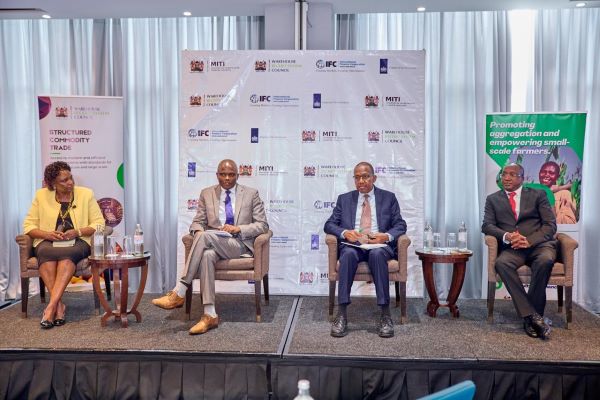Today, the Warehouse Receipt System Council, State Department for Trade, in partnership with the International Finance Corporation (IFC) and with support from the Embassy of the Kingdom of the Netherlands, hosted a groundbreaking breakfast forum in Nairobi. This event convened development partners and key stakeholders of the Warehouse Receipt System (WRS) to mobilize support and investment for its implementation, signaling a robust effort to structure commodity trading within the country.
The meeting was themed “Unlocking the implementation of the Warehouse Receipt System and strengthening institutions within the ecosystem to ensure the achievement of structured agricultural commodity trading in Kenya.”
The forum served as a platform to discuss the journey of the WRS since establishment of the Warehouse Receipt System Council, its future goals, and the necessary support to achieve these aims. Participants explored opportunities to strengthen existing partnerships and forge new ones, crucial steps towards unlocking investments in the WRS ecosystem. The meeting also involved panel discussions involving farmer organizations, warehouse operators, commodity buyers/ off-takers and financial Institutions.
Kenyan farmers have long grappled with food insecurity, post-harvest losses due to poor storage, aggregation and post-harvest handling, limited access to markets, lack of effective and transparent price discovery mechanisms through a commodity trading platform, and lack of affordable credit. A strong warehouse receipt system helps address these challenges.
Lucy Komen, Ag. CEO WRS Council says, “The Warehouse Receipt System is revolutionizing agriculture in Kenya by addressing longstanding challenges that have constrained the potential of agribusiness. With increased support from key stakeholders and development partners, we can extend these benefits more widely across the country, empowering farmers and traders to transition from price takers to price negotiators.”
According to IFC Country Manager Amena Arif, “IFC is pleased to support the Government of Kenya in its efforts to advance the WRS implementation. Our focus is on enhancing the regulatory framework and facilitating investment in storage infrastructure. This will not only give a boost to the agriculture sector but also pave the way for agro-processing and value-addition industries, creating jobs and enhancing food security.”
Looking forward, the WRS Council and its partners are committed to digital innovations that improve the efficiency and transparency of commodity trading. The adoption of digital systems allows real-time monitoring of transactions and commodity stocks, promising greater integrity and security within the WRS ecosystem. The Council is also committed to aligning efforts with the Sustainable Development Goals (SDGs).
Ongoing support from the Kingdom of the Netherlands has been pivotal. The Dutch Embassy’s involvement underscores a strong commitment to fostering sustainable agricultural practices and enhancing economic opportunities in Kenya. This partnership is instrumental in advancing the goals of the WRS, contributing to regional and international food security and financial inclusivity agendas.
The project, set to be completed by December 2025 at an estimated cost of USD 2,300,000, comprises five key components. It will develop regulatory frameworks and administrative tools for the Warehouse Receipt System, establish a central registry for warehouse receipts, and launch a public awareness series in partnership with the Media Council of Kenya. Additionally, the project will focus on capacity building for the WRS Council, financial institutions, farmers, and other stakeholders, and create a pipeline of bankable investments to attract private sector funding.
According to Felicity Nkirote Biriri, Chairperson of the WRS Council, “This system is essential to the Kenya Kwanza Government’s agriculture transformation agenda, enhancing food security, improving access to farm inputs, promoting environmentally friendly warehousing, and fostering inclusivity of youth, women and vulnerable groups in agriculture.”
In the 2023-2024 financial year, the Council has certified seven warehouse operators in key locations, issued multiple Warehouse Receipts for commodities like green grams and white maize thereby facilitating their financing and trade, and partnered with financial institutions to pilot a new financing product based on these receipts.
The Chairperson of WRS Council further said, “As we advance, I urge all key stakeholders and development partners to deepen their commitment to the Warehouse Receipt System. Your investment and expertise are crucial for its expansion and success. Together, we can transform agriculture and drive economic growth, making a lasting impact on our communities. Join us in this critical endeavor.”
Kenya’s Principal Secretary, State Department for Trade, Alfred K’Ombudo says, “The Warehouse Receipt System and KOMEX are key to positioning Kenya as a regional hub, enhancing our agricultural and financial sectors through strategic partnerships and international trade opportunities. With the government firmly committed to supporting and regulating this transformation, we invite the private sector to lead in investing and managing these initiatives. The support of development partners is also crucial to propel this agenda forward. Our recent international trade agreements, including those within the EAC, Africa, EU, and USA, underscore our readiness to expand Kenya’s trade capacity and global economic influence.”
The outcomes of this forum are expected to shape the future of agricultural commodity trading in Kenya, focusing on structured trading platforms, enhanced information dissemination to the grassroots, and creating an enabling environment for private sector investment.









